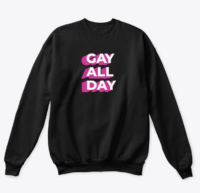The “New York Times” wonders if its harder to come out as bisexual
Steven Petrow wrote the book on queer etiquette, literally. Steven Petrow’s Complete Gay & Lesbian Manners addresses everything from social graces at same-sex weddings to current queer verbiage. Petrow also writes a bi-monthly column called “Civil Behavior” for the New York Times, in which he answers questions from gay and straight readers about good gay behavior. People who seek out books and newspaper articles on how to behave most civilly toward their fellow human beings are usually the people who need the advice least of all, and so even though Petrow’s column and subsequent discussions on his Facebook page take place in the age of mass Internet vitriol, the conversations are usually quite affable, even when they’re about hot button issues.
But not this month. No, this month Petrow answered a question from a reader who wanted some help coming out as bisexual, and, well: “It was the first time any topic has caused the Facebook algorithm to hide posts because of the language, and I’ve had to edit the remarks heavily to let even these few appear [in my column].”
Petrow wonders if coming out as bisexual is actually harder than coming out as gay, and it would seem that the “venomous responses” from his normally super-polite readership answered that the question with a resounding “yes.”
I firmly believe that one of the main reasons bisexual men and women have a harder time coming out (and living out, happily) is that there are so few positive representations of bisexual people in pop culture. Most bisexual TV characters, for example, fall into unfair and cliched tropes, like the Anything That Moves trope that says bisexual men and women will have sex with literally anyone or anything; or the Cherry Chapstick trope that takes Katy Perry‘s “I Kissed a Girl” lyrics – “hope my boyfriend don’t mind it!” – to the grossest extremes; or even the Depraved Bisexual trope that writes off all bi men and woman as Basic Instinct-esque sociopaths.
For the past several years, when doing their annual Values and Beliefs poll, Gallup has found that Americans are personally becoming more and more accepting of gay and lesbian people. Every year, GLAAD’s Network Responsibility Index reports the same thing. Only, GLAAD takes it a step further and asks survey participants whether or not LGBT TV characters have influenced their changing attitudes about gay people, and a majority of people always say yes. We have more positive representations of gay and lesbian people than ever before on our TVs, and Americans are more accepting than ever before about gay and lesbian people – so, it’s a no-brainier that we need better quality (and a higher quantity of) bisexual TV characters.
In recent years, we’ve lost Maya St. Germain from Pretty Little Liars and it seems like we’re losing Brittany S. Pierce from Glee. The once complicated, empowered Kalinda Sharma from The Good Wife was a beacon of hope for the bisexual community, but her storyline this season left even straight/mainstream critics shaking their heads in disbelief. Thank the heavens (and the Canadians) that we have at an awesomely authentic bisexual character to root for in Lost Girl‘s Bo Dennis, and thank ABC and Shonda Rhimes that we also have that in Grey’s Anatomy‘s Callie Torres.
Even Petrow agrees. As encouragement to the bisexual women who wrote to him, Paltrow said:
But what’s true for boomers is much less so for millennials, who have grown up with less antipathy toward bi people and are more likely to have been influenced by the well-respected and much-loved bisexual character Dr. Calliope Torres on Grey’s Anatomy (who’s had monogamous relationships with male and female characters) than Basic Instinct.
We’re also lucky that Anna Paquin and Evan Rachel Wood – both of whom are outspoken bisexual celebrities – continue to use their voices to counter the messages coming from “not really” bisexuals like Lindsay Lohan.
Petrow’s advice for coming out as bisexual is really solid (you should read it if you’re struggling to find the courage and words to come out as bi), and he ends with this lovely bit of encouragement: “Whether you call yourself bi, fluid, queer or something else, don’t get bogged down in the verbiage; choose instead to embrace your life as it is.”
Do you agree that it is harder to come out as bisexual? Why do you think even the most well-mannered members of the queer community express such harsh sentiments toward bi folks?

